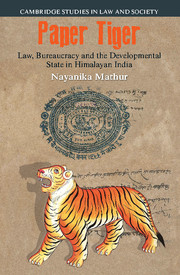Book contents
- Frontmatter
- Dedication
- Contents
- List of Figures
- Glossary
- Acronyms
- Acknowledgements
- Map
- Prologue
- Introduction
- 1 A Remote Town
- The Paper State
- 2 The State Life of Law
- 3 The Material Production of Transparency
- 4 The Letter of the State
- 5 Meeting One Another
- Paper Tiger?
- Conclusion: The State as a Paper Tiger
- References
- Index
3 - The Material Production of Transparency
from The Paper State
Published online by Cambridge University Press: 05 October 2015
- Frontmatter
- Dedication
- Contents
- List of Figures
- Glossary
- Acronyms
- Acknowledgements
- Map
- Prologue
- Introduction
- 1 A Remote Town
- The Paper State
- 2 The State Life of Law
- 3 The Material Production of Transparency
- 4 The Letter of the State
- 5 Meeting One Another
- Paper Tiger?
- Conclusion: The State as a Paper Tiger
- References
- Index
Summary
NREGA was widely dismissed as an ‘un-implementable’ programme by lower-level officials and members of the Panchayat system. As I started travelling to different villages, on my own or as part of a larger entourage, I struggled to find any public asset built under NREGA or to meet any labourers who had worked under the scheme. NREGA was conspicuous by its absence. This lack of visibility of NREGA was perplexing given the socio-economic profile of Chamoli, which was one of my primary reasons for choosing it as my field work site: official statistics claim that 47.5 per cent of its population lives below the poverty line; by all accounts unemployment is the biggest problem. For these reasons, Chamoli figures on the Indian Planning Commission's list of ‘200 most backward districts’ in the country, making it an eligible recipient for the very first round of benefits dispensed under the NREGA. Further, there is a high level of distress out-migration of male employment-seekers to urban centres in the plains, where they typically end up working as menial and/or manual labour. Surely, I had reasoned, villagers would prefer working in their own villages on what the scheme describes as ‘productive assets’ to seeking similar forms of work in alien and much harsher conditions in the plains? Employing the same logic, NREGA sets up curtailment of distress migration as one of its key objectives.
To my queries on why there seemed to be no work happening under the auspices of the programme, senior officials and development practitioners alike had a ready answer. They highlighted certain defining features of Chamoli: the district has a primarily ‘upper’ caste, highly literate population with a large number of female-headed households, as men tend to out-migrate to the plains in search for jobs. This sort of a population, they claimed, makes for a very low demand for public works programmes. Further, Chamoli's location in the middle and the upper Himalayas, with 50 per cent of its landmass under snow, makes it a difficult region in which to undertake laborious public works; most unskilled and manual labour tends to be outsourced to immigrant Nepalis who are not legally entitled to work under the NREGA; and the daily wage rate of Rs 73 is too low in a market where private contractors pay anything between Rs 100 and 150 per day for unskilled labour.
- Type
- Chapter
- Information
- Paper TigerLaw, Bureaucracy and the Developmental State in Himalayan India, pp. 81 - 96Publisher: Cambridge University PressPrint publication year: 2015



